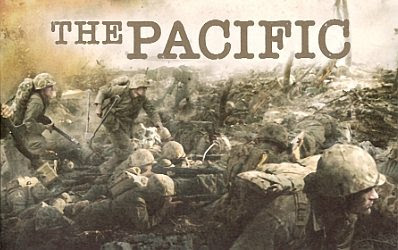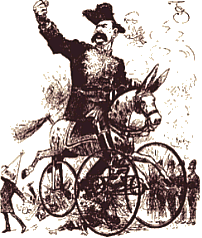After a long hiatus, Apollon Zamp returns with guest-essay reviewing the television series “The Pacific”. In the wake of last night’s discussion of “Bomber” Harris, this post provides a look at the other major theater in World War Two — and the historical revisionism concerning it that has now become dominant in popular culture.
 The Pacific: A Regrettable Lack of Common Virtues
The Pacific: A Regrettable Lack of Common Virtues
by Apollon Zamp
I was fourteen years old when I saw Saving Private Ryan (against the express wishes of my parents). Having long been fascinated by World War Two history — I was perhaps the only twelve-year-old with a subscription to WWII Magazine — I was amazed by what Tom Hanks and Steven Spielberg had managed to create. The visceral and horrific nature of war was plainly evident — as were the bonds that form between men who fight alongside each other, and the pain they share and struggle to repress when their buddies get wounded or killed. Spielberg was trying as hard as possible to re-create the realities of war, and many veterans have attested to his success in doing so.
The success of the film was part and parcel of a greater re-awakening of Americans’ interest in their country’s part in World War Two. Tom Brokaw’s The Greatest Generation and a slew of Second World War-themed video games bear witness to this. (Tycho Brahe, author of the gaming webcomic Penny Arcade, once remarked that “Normandy Beach is the new Hoth,” which indicates the intensity of the cult-like status that World War Two-themed material had gained.)
Spielberg and Hanks continued where they had left off with Saving Private Ryan with the HBO miniseries Band of Brothers. The series ties in briefly with Ryan — we see paratroopers from the 101st Airborne Division throughout the film, and the titular James Francis Ryan is himself a private in Baker Company, 506th Parachute Infantry Regiment — one of the three regiments that formed the backbone of the 101st. However, whereas Ryan focused on the Normandy invasion as a whole — featuring troops from the 29th Infantry Division, the 2nd Rangers, and the 101st Airborne — Band of Brothers focused on one company — E (“Easy”) Company, 506th PIR, 101st Airborne — for the duration of the war.
One of the things that really stood out about Band of Brothers was the chemistry among the cast. This was not an accident, nor a fluke. Dale Dye, a retired Marine Corps officer, provides technical support for military movies, and is known for his adherence to realism and realistic portrayals of fighting men. He provided the technical direction for Ryan, during which he put the actors involved through a miniature two-week “boot camp.” Part of his method was to exclude Matt Damon, who played Ryan, from the training, thus creating a real element to the other characters’ dislike of Ryan which came through on the screen.
Dye’s methods were similarly applied to Band of Brothers. He put the men who were going to portray actual veterans (in some cases, veterans who were still alive) through a truncated version of parachute infantry school, complete with physical training, battlefield exercises, and simulated indoor jump exercises similar to what current airborne infantry troops go through during training. A chemistry naturally developed among the actors involved — a chemistry that was no doubt enhanced by Dye’s farewell speech at the end of the training period, reminding the men who were going to serve as the avatars of E/506th PIR that they had a responsibility and a privilege to represent those who had fought their way across Europe between June 1944 and May 1945.
This chemistry shone through for the entirety of the series, both in positive senses — the obvious camaraderie and brotherly devotion the men had for each other — as well as the negative — for example, the scenes that take place in Bastogne, which showed the hardships endured as young men barely out of their twenties watched each other get maimed, killed, or suffer nervous breakdowns. The skilled production, beautiful cinematography, and the almost kinetic spark of shared energy among the actors involved combined to make this an excellent series. To top it all off, the producers never aired any of the episodes until the veterans from Easy Company — who served as valuable sources of firsthand information — had watched and approved the content as historically accurate.
All of this served as a rather dramatic backdrop for The Pacific, which aired nine years after Band of Brothers. Once again, Hanks and Spielberg had partnered up, with Dale Dye once again providing technical direction, except this time they were covering a part of the war that had not been featured in either Ryan or Band of Brothers. The Pacific Theater — which, arguably, was a more far-flung and confusing theater than the European one — until that point had only been explored by mind- and posterior-numbing exercises in navel-gazing such as The Thin Red Line. Many people, myself included, couldn’t wait to see the Hanks/Spielberg/Dye take on the Pacific theater, complete with the same rich cinematography and sparkling character performances that their earlier works had showcased.
And then I watched it.
To call The Pacific disappointing is an understatement. It falls short on many levels, so I’m only going to consider three of them — firstly, considered on its own merits as a narrative; secondly, how it compares to Band of Brothers and Ryan in terms of characterization; and finally, the attitudes of the producers, most notably Tom Hanks.
The Pacific is riddled with narrative incoherencies and flaws throughout. First of all, none of the main characters are in the same unit. They’re all Marines, but Robert Leckie is in the 2nd Battalion, 1st Marines, while Eugene Sledge is in the 3rd Battalion, 5th Marines. John Basilone, the third protagonist, serves with the 1st Battalion, 7th Marines for part of the series, and the 1st Battalion, 27th Marines for the latter part of the series. The episodes are arranged haphazardly and give the impression that someone dropped a lot of cut film on the floor and put it back together in a hasty fashion.
In one episode, Eugene Sledge appears for a grand total of thirty seconds or so, getting yelled at by his drill instructor. Why was this scene necessary? More to the point, why is that one of the few scenes that shows the rigors of Marine boot camp? There are things the audience knows that it needs to see as well. We know that Marines were well-trained and hardened prior to being shipped out to face the horrors of jungle combat, but we need to see their development from callow, eager youth to seasoned, trained, soldiers. Instead, for instance, we see Leckie telling his apparent love interest, Vera, that he’s joining the Marines. We see him exchanging an awkward farewell with his distant father, and then we see him on a troop transport, getting ready to land on Guadalcanal. (As an aside, this scene features a possible runner-up for the worst pre-combat briefing ever, which I reproduce in its awful entirety:
“Forget all the horse**** you’ve heard about the Japs. They’ve had their turn. Now it’s our turn. The treacherous bastards may have started the war, but I promise you, we will finish it. Those slant-eyed monkeys want to use that **** island and its airfield to kill us! We’ll yank the surviving Japs out of their ****-filled holes by their yellow balls! They’ll go round-eyed when the first American planes land at their airfield! Heads down in the boats. Hit the beach. Keep moving to your rendezvous points and primary objectives. When you see the Japs, kill ’em all!” )
I’m accustomed to this kind of swill from exploitation artists like Stone and Tarantino, but Spielberg and Hanks are two people from whom I expect better. Band of Brothers had many examples of officers treating their men like intelligent human beings who needed to have information at their disposal — terrain, estimates of enemy forces, tactics upon arrival and a set of goals to complete their mission, etc. This post-modernist irony-laden speech has none of that — only a sneering contempt for what it considers to be the prevailing attitude of the typical Marine officer. Granted, the average American felt more antipathy towards the Japanese, and did indulge in more racial slurs towards them (as opposed to the Germans, with whom many Anglo-Saxon Americans shared a common heritage anyway), but my intelligence as a viewer felt sorely insulted by this travesty of a pre-battle speech.
At this point, we have three protagonists in separate units doing vastly different things. John Basilone’s heroism on Guadalcanal — during which he and his unit held off a 3,000-strong Japanese regiment — is rewarded with the Congressional Medal of Honor and he is sent home to for a stateside War Bond tour. Eugene Sledge is sent first to Palau and then to Peleliu. Leckie is also on Peleliu — perhaps the only instance where any of the three are in close physical proximity — but is wounded by an explosion and sent home on a hospital ship. Basilone is promoted to Gunnery Sergeant and helps train the men of the 27th Marines that will eventually land on Iwo Jima. (Oddly, the episode in which he takes up the mantle of drill instructor takes place an episode after the Peleliu, despite the fact that he became a drill instructor in the winter of 1943 and the battle of Peleliu took place in the fall of 1944, which only serves to reinforce the pre-existing narrative inconsistency and lack of cohesion.)
In one of the most baffling stylistic choices of the entire series, we are treated to a ten-minute scene on Iwo Jima — the only mention of the battle that Hanks and Spielberg saw fit to make. In it, we see John Basilone doing what will eventually earn him a posthumous Navy Cross: flanking and destroying a blockhouse, killing the Japanese soldiers inside it, guiding a tank through a minefield, and eventually being killed by enemy fire. Band of Brothers dedicated two episodes each to the Normandy Campaign, the Market-Garden/Holland Campaign, and the siege of Bastogne, but somehow The Pacific manages to devote all of ten minutes to one of the most defining battles in Marine history, the only U.S. Marine battle of the war in which overall American casualties outnumbered those of the Japanese. The battle of Iwo Jima remains as important to the Marine Corps — if not more so — as Bastogne is to the 101st Airborne. Considering the eventual importance of Iwo Jima to the Air Force’s raids on Japan, which culminated in the dropping of the atomic bomb, its omission from the storyline is glaring.
So much for the narrative. I’ve already mentioned in a few asides how The Pacific differs from Band of Brothers, but there are other elements missing as well. Band of Brothers managed to walk a fine line by pointing out men worthy of respect and admiration (Richard Winters, Carwood Lipton, medic Eugene “Doc” Roe, and many others) and holding them up as paragons of gentlemanly virtues and honorable characteristics. Other characters, such as Bill Guarnere, Ronald Speirs, and Roy Cobb, displayed baser tendencies but remained sympathetic characters — Ronald Speirs’ ascendance from a shadowy figure rumored to have murdered POWs to the capable, if stern, commander of Easy Company remains one of my favorite character arcs of the series. We understand Bill Guarnere’s hatred of Germans — he discovers that his brother was killed in Monte Cassino, Italy, hours before dropping into Normandy on D-Day — even if we don’t condone it.
The men in The Pacific lack such identity. Leckie seems eager enough to join up, but once he’s there, he becomes a sardonic figure, imbued with the kind of irony that seems unlikely to have existed in the 1940s. His friends are two-dimensional stereotypes, and I find it hard to describe them, because I honestly don’t have much of a memory of who they are or what makes them unique as characters — this despite having seen the series in the past month. By comparison, in Band of Brothers, the men of Easy Company stand out as individuals. Richard Winters is an obvious protagonist, but the show doesn’t focus on just him — one episode is devoted entirely to the hardships suffered by the company’s medic, who is forced to scrounge and make do with the scant medical supplies of a besieged division. Repeated viewings have made the characters stand out more, but I get the uneasy feeling that I could watch The Pacific on repeat and never get a sense of the personalities of Leckie’s supposed buddies.
Basilone has two best friends on Guadalcanal, one of whom dies and one of whom survives (and is never heard from again after Basilone leaves for the United States). Afterwards, though, he doesn’t really have comrades as such — just a string of adulating family members, friends, and groupies. His love interest (and, eventually, wife), Lena Riggi, is one of the few characters — female or otherwise — in the series who seems to be her own person. Her interactions with Basilone are actually somewhat painful to watch — he’s supposed to be (and is) a hero, and yet her qualities are much more what we as viewers would associate with heroism. It would have been refreshing and interesting if the directors and producers had examined that kind of characterization and interaction more closely, but darn it, there was a timetable, and that interminable slow-motion shot of John Basilone exhaling his dying breath on a bloody Iwo Jima beach just couldn’t wait.
Sledge has the dubious distinction of being the most fleshed-out of any of the characters. He defies his father’s wishes to join the Marine Corps, despite a pre-existing heart condition, and we see his transition from idealistic, eager youth into a hardened, battle-weary Marine. The episodes with Sledge come the closest to Band of Brothers — the camaraderie among the soldiers, the idealization of their commanding officer (who, unlike his counterpart Richard Winters, dies a hero’s death at the hands of a Japanese sniper), and the examination of the psychological “breaking point” of men involved in prolonged combat situations. However, it still falls short of what Band of Brothers created — as much as we might empathize with Sledge, we don’t really connect with him.
Most of these criticisms are probably due to the lack of involvement on the part of the veterans portrayed. Several veterans who show up in the series did offer first-hand accounts of the battles, but none of the three protagonists were alive for filming — Basilone obviously died in 1945, and Sledge and Leckie both passed away in 2001. A large part of what made Band of Brothers great was the fact that it focused on one unit, and using the stories of the men who made it up to create a holistic narrative structure. That type of structure is sadly lacking in The Pacific.
Finally, it’s worth noting the attitudes of the people — or, in this case, one person — involved. Tom Hanks notoriously referred to the war in The Pacific as “America’s racist war:”
Appearing on MSNBC’s “Morning Joe” on March 5, Hanks said that The Pacific depicts a war of “racism and terror” and asked the interviewer if that sounded “familiar to what we might be going through today.”
Band of Brothers made no political statements. It showed frankly the experiences of a combat unit in Europe — good and bad, redemptive and traumatic. The Pacific — in Tom Hanks’ mind, apparently — is meant to make a political statement, and this may explain even more about why it fails as a series. The war with Japan was racially charged, to be sure, but to call it “racist” is to take an extreme leap. It’s also rather appalling, given that Germany was itself perpetrating a racist war against Jews, Gypsies, and other minorities throughout Europe at the same time. I’d like to think that Hanks was merely oblivious in his cognitive moral dissonance, but at this point I’m honestly not sure.
It’s also telling that little mention is made of Japanese atrocities towards Americans, as well as the vast majority of the Asian populations of countries occupied by Japan. American citizens were not unaware of Japan’s behavior in cases such as the Rape of Nanking or the conquest of the Philippines. However, scenes in which Americans loot Japanese corpses for their gold teeth or murder wounded Japanese prisoners remain contextless — there is no mention that a motive besides racism and hatred might underlie the attitude of the average American Marine.
It’s obvious that a great deal of effort and care went into The Pacific. It’s also apparent that Hanks and Spielberg really did mean to create a stylistic sequel of sorts to Band of Brothers, which makes their failure all the more poignant.
As someone who has interviewed veterans of World War Two for a journalism project, and as a fan of historical accuracy in general, I cannot in good faith recommend The Pacific — its essence falls disappointingly short of both its ambition and the truth.

 I’ll be away from my desk for the next few days. The news feed will be suspended while I’m gone, and resume upon my return.
I’ll be away from my desk for the next few days. The news feed will be suspended while I’m gone, and resume upon my return. Ahmed Shafiq, the last Egyptian prime minister to serve under Hosni Mubarak — and recently defeated by Mohammed Morsi in the presidential election — has left Egypt for Abu Dhabi along with his entire family. Mubarak’s former head of intelligence has also moved his whole family to Abu Dhabi.
Ahmed Shafiq, the last Egyptian prime minister to serve under Hosni Mubarak — and recently defeated by Mohammed Morsi in the presidential election — has left Egypt for Abu Dhabi along with his entire family. Mubarak’s former head of intelligence has also moved his whole family to Abu Dhabi.




